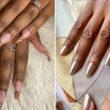Skincare products won’t exactly give you the magic you want if you do not know your skin type and know how to care for it, skin type varies, therefore, the method of keeping it healthy differs, every skin type has it’s symptoms and reaction to factors like age, hormone, genetics and weather hence why knowing your skin type will help you determine how to care for it more. In order to also get the best out of your skincare product, you need to know your skin type.
Knowing your skin type will also be useful in providing you with information on how best you can protect your skin and also treat in in case of skin irritations.
This post will give you all you need to know about your skin and how you can determine what skin type you have, and this will help you tackle any skin problem and also keep you informed on how to keep your skin safe from some unavoidable factors.
Why Do I Need To Know My Skin Type?
Most people still wonder why they need to know their skin type as long as a product can be used to treat an inflammation however knowing your skin type might prevent having to use the wrong skin product which might cause more damages to your skin or rather aggravate your skin more and lead to more skin irritations.
There are several skincare products out there and they only work best if you know your skin type and use the one formulated for it.
Knowing your skin type will prevent the use of the wrong skin care product as you will be well informed on how best to maintain your skin and avoid unhealthy skin breakouts.
What is the difference between skin type and skin condition?
Learning the difference between skin type and skin condition is important and fairly easy to discover, the difference will prepare you for the needed treatment and care.
Skin type is generally normal and everyone is borne with it, it also can’t be treated, just controlled and maintained while skin condition is an occurrence that might have taken place on your skin due to some internal or external factor.
The skin condition can be treated but treating it solely depends on your skin type as some skin conditions like acne, eczema dehydration, acne, aging, sun damage, rosacea, eczema, psoriasis, pigmentation and many more can be treated pertaining to the products that suit your skin type.
Can My Skin Type Change?
According to some researches, it has shown that yes your skin type can change but that has a lot to do with aging, genetics, and change of environment can also play a role in that.
Skin type is something you are born with so if changes are been noticed, this might have happened as a result of some factors that are reducing the production of melanin which could alter your skin reaction to some certain skin conditions.
How To Choose Moisturizer According To Your Skin Type
Knowing your skin type is one but choosing a moisturizer can be a little tricky, moisturizers are important for all skin types but there are also different moisturizers for different skin types. Oily skin moisturizer would not be advisable for dry skin type.
If your skin is the dry type, you might want to go for ointment and for normal skin type, creams are better at keeping it well hydrated, lotions are perfect for oily skin, combination skin would need two types of moisturizer, light one for the T-zone and heavier one for the cheek, sensitive skins are advised to go for all-natural moisturizer to avoid skin irritation.
The thickness and frequency of your moisturizer should be based on your body, all skin types require a light hydrating moisturizer during summer.
5 Skin Types And How to Know Yours
Every skincare products have been formulated according to your skin type, this is post has been tailored for you to understand your skin and pay more attention to your skin type regardless of your skin tone.
1. Normal Skin

This skin type is usually referred to as the well-balanced skin type but still needs the right products to keep it that way, and the scientific name for this healthy skin is eudermic, which means it’s neither too oily or too dry. Normal skin requires fewer efforts and products in maintaining them.
How To Identify Normal Skin
To identify normal skin is simple and requires no special efforts, here are things you should take note of to identify normal skin. Normal skin can be maintained with a natural moisturizer, washing your face twice a day or less as not to strip it of nutrients.
- Fine pores that require fewer efforts in treating
- Zero blemishes
- A smooth, velvety and soft skin texture
- A rosy color uniform transparency
- Good blood circulation
2. Dry Skin
Dry skin is usually due to the skin not being able to retain sufficient moisture, it produces less sebum than normal skin and therefore becomes dry as a result of the less sebum produced, dry skin is a common skin type and might lead to some flaky skin conditions although dry skin severity varies and oftentimes it just requires more maintenance and control than a normal skin. It is essential to drink lots of water to keep dry skin hydrated, moisturizer is also important and avoids harsh cleanser.
How To Identify Dry Skin
Since dry skin depends on how dry it has become, identifying it also depends on how severs it has gotten.
Dry Skin
This is not too extensive and can be easily controlled, dry skin is usually just dry drier than normal, dry acne that can cause black heard and white heard, it can move from being dry to very dry and extremely dry.
Very dry skin
Very dry skin might show signs like
- Milk flakiness and dryness in patches
- A feeling of tightness around the skin
- Some possible itchiness
- A red or blotchy appearance
Extremely dry Skin
Extremely dry skin can cause some skin conditions if timely identification and control are not done. A certain part of the body is prone to show the symptoms more, extremely dry skin should also try changing lifestyle and habits using hot water, taking long walks which can strip the oil from your skin.
- Roughness and flakiness around certain areas of the body like feet, elbows, and knees.
- Scaling and calluses
- Frequent itchiness
- Cracked skin
Extremely dry skin is usually common among elderly or dehydrated skin.
3. Oily Skin
This might be a little okay as the sebum which produces the excess oil also protects and nourishes the skin but oily skin tend to be more prone to acne and makeup tend to slide off easily on oily skin.
How To Identify Oily Skin
This should be really easy as oily skins are more pronounced on the face
- A glossy shine
- Enlarged, visibly pores
- A thicker pale skin
- Whiteheads and blackheads depending on the form of acne.
4. Combination Skin
Combination skin is a little more complicated as it’s a combination of oily and dry skin type in the T-zone. it tends to be tricky in maintaining and makes product choosing more difficult, it can also change as the season changes and become drier or produce more oil. It is important to stick to natural products if you have combination skin, use different moisturizer, lighter one for the oily arear and heavier moisturizer on your cheek arear or the driest parts.
How To Identify Combination Skin
- T-zone enlarged pores which are your forehead, chin, and nose
- Oily T-zone
- Circumference of your face and cheek are drier.
5. Sensitive Skin
Sensitive skin is more irritated by practically all the factors that cause skin conditions more than normal skin, sensitive skin might take a form of any other skin type depending on the skin type products you use, you might also want to avoid products with fragrance and harsh chemical. Sensitive skin needs the best and proper care routine, avoid harsh products completely and stick more to a natural skincare routine.
How To Identify Sensitive Skin
- it turns red to harsh sunny weather
- It might react to caffeine, spicy foods or alcohol
- Itching and burning
- Scaling in cold weather
If your skin tends to react practically to everything and becomes more sensitive to every product you use then you might want to talk to your dermatologist.
Any skin type can be managed and controlled, you should consult your doctor and dermatologist if you are concerned about sensitive skin or using a skin product for your skin and it still reacts badly, that can be due to rosacea.
Read more on beauty and skincare tips:
- Is Aloe Vera Good For Oily Skin? What We Found
- Why Creating a Skincare Routine is a Perfect Way to Save your Skin
- How to Get Glowing Skin Naturally (Foods, Plants)
- 7 Incredible Vitamin E Oil Benefits for Skin Care
- Everyday Summer Skincare Essentials: 13 Sunscreens Under $15 to Buy
Ensure to always have a natural cleanser at hand irrespective of your skin type to rid it of impurities.












